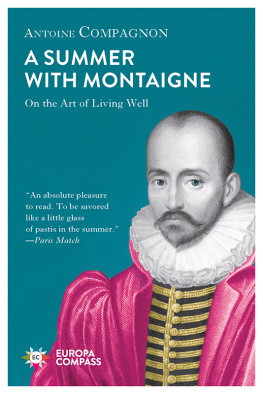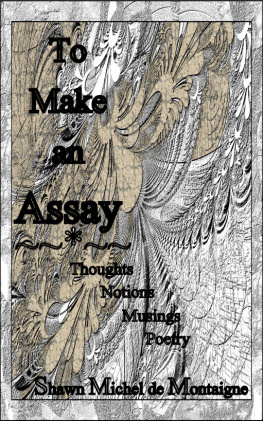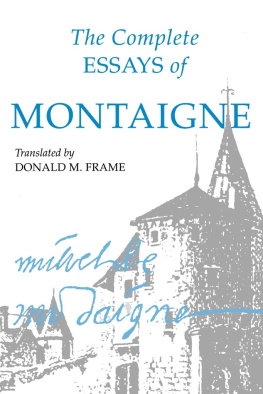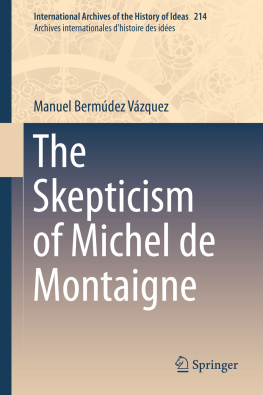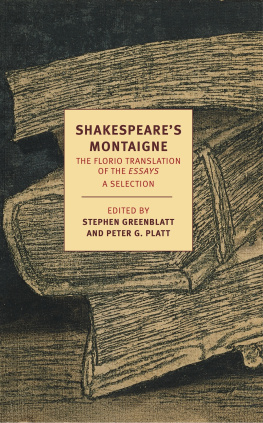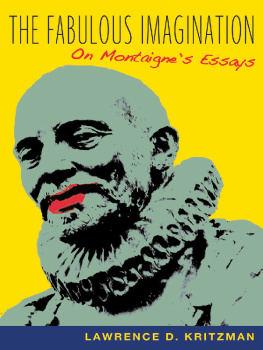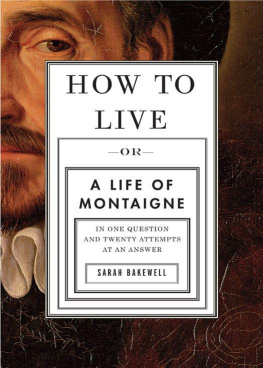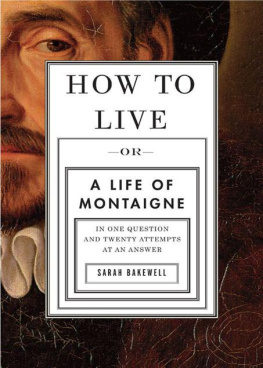A SUMMER
WITH MONTAIGNE
People would be lying on the beach, or sipping cocktails, getting ready to have lunch, and theyd hear you chatting about Montaigne on the radio. When Philippe Val asked me to give a short talk about Essays on France Inter every weekday for the span of a summer, the idea seemed quite bizarre to me, and the challenge of it so risky, that I didnt dare try to wriggle out of it.
First of all, reducing Montaigne to brief extracts went completely against everything I had learned, and against the conventional wisdom of my student years. Back then, they were denouncing the practice of pulling traditional morals out of the Essays in the form of single sentences, and advocating going back to the text, with all its complexity and contradictions. Anyone trying to serve Montaigne up in bite-size pieces would have been ridiculed straight away, declared minus habens, and consigned to the dustbin of history like Pierre Charron, the author of Trait de la Sagesse (On Wisdom), a collection of maxims borrowed from the Essays. Breaking this taboo, or finding a way around it, was a tempting proposition.
Next, choosing forty or so passages of a few lines each in order to chat briefly about them, while at the same time showing both their historic significance and their current relevance seemed an impossibly tall order. Should I just choose pages at random, like Saint Augustine opening the Bible? Should I have a third party pick them? Should I just tear through the major themes of the book? Give a broad overview of its richness and diversity? Or should I simply focus on a few of my favorite excerpts, without worrying too much about unity or completeness? In the end I did all of these things at once, without order or premeditation.
Finally, being on the air during the time slot once occupied by Lucien Jeunesse, to whom I owe the best part of my adolescent knowledge, was an offer impossible to refuse.
Translators note: The text referred to throughout is the 1877 edition of Charles Cottons translation of the Essays, edited by William Carew Hazlitt.
1
E NGAGEMENT
B ecause Montaigne deliberately portrayed himself as a plain-dealing man of leisure, one of the idle rich who kept himself secluded on the family estate and had withdrawn to the refuge of his library, we forget that he was also a public man deeply engaged in the affairs of the century in which he lived, and that he held significant political responsibilities during a troubled period in our history. He served as a negotiator between Catholics and Protestants, between King Henry III and Henry of Navarre, the future Henry IV, a role from which he drew this lesson:
In the little I have had to mediate betwixt our princes in the divisions and subdivisions by which we are at this time torn to pieces, I have been very careful that they should neither be deceived in me nor deceive others by me. People of that kind of trading are very reserved, and pretend to be the most moderate imaginable and nearest to the opinions of those with whom they have to do; I expose myself in my stiff opinion, and after a method the most my own; a tender negotiator, a novice, who had rather fail in the affair than be wanting to myself. And yet it has been hitherto with so good luck (for fortune has doubtless the best share in it), that few things have passed from hand to hand with less suspicion or more favor and privacy. I have a free and open way that easily insinuates itself and obtains belief with those with whom I am to deal at the first meeting. Sincerity and pure truth, in what age soever, pass for current. (III, 1)
His entire adult life was marked by civil warsthe very worst kind of wars, he reminds us readily, because they pit friends and brothers against one another. The decades between 1562when he was not yet thirty years oldand his death in 1592 consisted of a series of battles, skirmishes, sieges, and assassinations relieved only by brief truces.
How did he survive it all? He often wonders this in the Essays; this particular passage above is from the chapter entitled Of Profit and Honesty, which opens Volume Three, written after his harrowing experience as mayor of Bordeaux during a time of war and plague.
Profit and honesty: Montaigne addresses the question of public morality, or ends and means, the reasons of state. Machiavelli and political realism were the order of the day, incarnated in the person of Catherine de Medici, the daughter of Lorenzo II, to whom Machiavelli had dedicated The Prince. The Queen Mother, widow of Henry II and mother of the last three Valois kings, had given the order that unleashed the worst atrocity of the era: the Saint Bartholomews Day massacre.
Machiavellianism asserts that it is permissible to lie, to break ones word, even to kill when it is in the best interests of the State, in order to ensure governmental stability, which is seen as the supreme good. Montaigne never became comfortable with this, denouncing dishonesty and hypocrisy wherever he found them. He invariably presents himself just as he is and says precisely what he thinks, disregarding etiquette. He prefers openness, directness, and loyalty to what he calls the covered path. For him, the end does not justify the means, and he is never prepared to sacrifice private morality for reasons of State.
Such foolish behavior, Montaigne realizes, has done him no harmhas, in fact, brought him success. His conduct is not just more honest; it is more profitable as well. If a public figure lies once he is never believed again; he has chosen an expedient over the long term, and he has made the wrong decision.
According to Montaigne, sincerity and fidelity to ones pledged word constitute a much more profitable way of behaving. If you are not driven to honesty by moral conviction, practical reason should be incitement enough.
2
C ONVERSATION
H ow does Montaigne comport himself in conversation, whether an informal chat or an official discussion? He answers this question in the chapter Of the Art of Conference in Book Three of the Essays. Conference is dialogue, deliberation. Montaigne presents himself as a man amenable to hearing other peoples ideas; open and accessible, rather than stubborn, narrow-minded, and unyielding in his opinions.
I hail and caress truth in what quarter soever I find it, and cheerfully surrender myself, and open my conquered arms as far off as I can discover it; and, provided it be not too imperiously, take a pleasure in being reproved, and accommodate myself to my accusers, very often more by reason of civility than amendment, loving to gratify and nourish the liberty of admonition by my facility of submitting to it. (III, 8)
Montaigne assures us that he respects the truth, even when it is spoken by someone unlikeable. He is not arrogant, and does not see contradiction as a humiliation. If wrong, he prefers to be corrected. What he does not like in his conversational partners is conceit; people who are overly sure of themselves or intolerant.
Montaigne seems, then, to be the perfect enlightened gentleman: liberal, respectful of others ideas, without ego; never seeking to have the last word. In short, he does not see conversation as a battle to be won.
Soon enough, however, he does add a qualification: if he does concede to an opponent, it is out of politeness more than a desire to improve himself, especially if his sparring partner is self-important. In these cases, he yields, but without altering his private convictions. Isnt this a falsehood on his part, despite his endless exaltation of sincerity? He tends to give way to his bolder adversaries, and even to others, without resisting, out of sheer courtesyso that they can continue to disabuse and enlighten him, he says. We must cede our arms to the other, or at least let him

